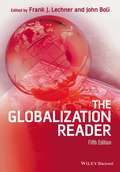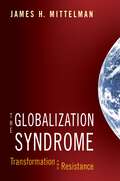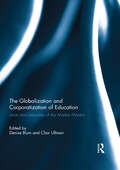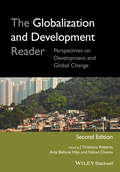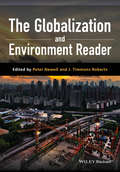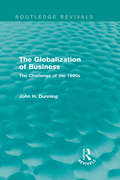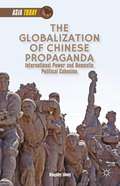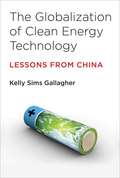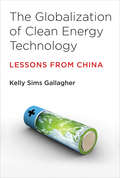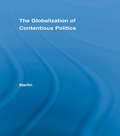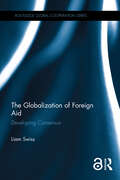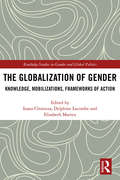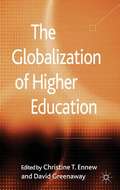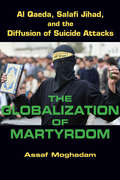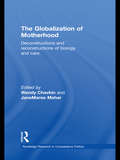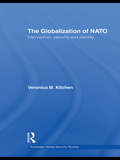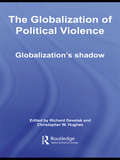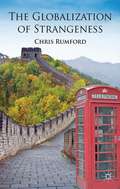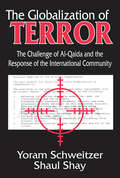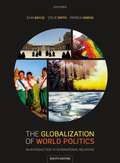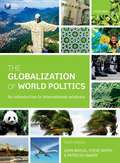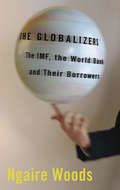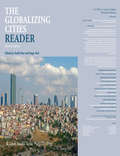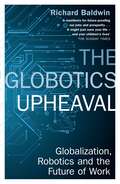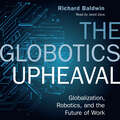- Table View
- List View
The Globalization Reader, Fifth Edition
by John Boli Frank J. LechnerCompletely revised and updated, the fifth edition of this well-regarded textbook charts key topics and recent research in globalization along with the latest complexities and controversies in the field.
The Globalization Syndrome: Transformation and Resistance
by James H. MittelmanHere James Mittelman explains the systemic dynamics and myriad consequences of globalization, focusing on the interplay between globalizing market forces, in some instances guided by the state, and the needs of society. Mittelman finds that globalization is hardly a unified phenomenon but rather a syndrome of processes and activities: a set of ideas and a policy framework. More specifically, globalization is propelled by a changing division of labor and power, manifested in a new regionalism, and challenged by fledgling resistance movements. The author argues that a more complete understanding of globalization requires an appreciation of its cultural dimensions. From this perspective, he considers the voices of those affected by this trend, including those who resist it and particularly those who are hurt by it. The Globalization Syndrome is among the first books to present a holistic and multilevel analysis of globalization, connecting the economic to the political and cultural, joining agents and multiple structures, and interrelating different local, regional, and global arenas. Mittelman's findings are drawn mainly from the non-Western worlds. He provides a cross-regional analysis of Eastern Asia, an epicenter of globalization, and Southern Africa, a key node in the most marginalized continent. The evidence shows that while offering many benefits to some, globalization has become an uneasy correlation of deep tensions, giving rise to a range of alternative scenarios.
The Globalization and Corporatization of Education: Limits and Liminality of the Market Mantra
by Denise Blum and Char UllmanThe forces associated with globalization, whether economic or social, have conditioned the ways educators operate, and have profoundly altered people‘s experiences of both formal and informal education. Globalization, as a multidimensional, multilevel process, is unequivocally, but not exclusively, based on the economics of neoliberalism. This book chronicles new sites of tension in education that are a result of an ever-globalizing economy and its accompanying neoliberal practices in the United States, Costa Rica, and the US territories in the Caribbean. The contributions are grouped into two areas: institutionalized schooling practices and non-formal educational practices that focus on identities and language.Each chapter questions the neoliberal market mantra that education must be rebranded into a marketable product and consumed by individuals, making a complex and compelling ethnographic argument that the market mantra is bankrupt. The authors argue that globalization produces liminal subjects and leads to the destruction of social institutions like education that are essential to democratic governance. The aim of each article is to uniquely disentangle the dynamics of the process, so as to resolve the mystery of how globally inspired paradigms and policies mix with locally defined structures and cultures. In assessing globalization‘s relationship to educational change, we need to know how globalization and its ideological packaging affect schooling, from transnational paradigms, to national policies and to local practices.This book was originally published as a special issue of the International Journal of Qualitative Studies in Education.
The Globalization and Development Reader: Perspectives on Development and Global Change
by J. Timmons Roberts Nitsan Chorev Amy Bellone HiteThis revised and updated second edition of The Globalization and Development Reader builds on the considerable success of a first edition that has been used around the world. It combines selected readings and editorial material to provide a coherent text with global coverage, reflecting new theoretical and empirical developments. Main text and core reference for students and professionals studying the processes of social change and development in “third world” countries. Carefully excerpted materials facilitate the understanding of classic and contemporary writings Second edition includes 33 essential readings, including 21 new selections New pieces cover the impact of the recession in the global North, global inequality and uneven development, gender, international migration, the role of cities, agriculture and on the governance of pharmaceuticals and climate change politics Increased coverage of China and India help to provide genuinely global coverage, and for a student readership the materials have been subject to a higher degree of editing in the new edition Includes a general introduction to the field, and short, insightful section introductions to each reading New readings include selections by Alexander Gershenkron, Alice Amsden, Amartya Sen, Anne-Marie Slaughter, Cecile Jackson, Dani Rodrik, David Harvey, Greta Krippner, Kathryn Sikkink, Leslie Sklair, Margaret E. Keck, Michael Burawoy, Nitsan Chorev, Oscar Lewis, Patrick Bond, Peter Evans, Philip McMichael, Pranab Bardhan, Ruth Pearson, Sarah Babb, Saskia Sassen, and Steve Radelet
The Globalization and Environment Reader
by Peter Newell J. Timmons RobertsThe Globalization and Environment Reader features a collection of classic and cutting-edge readings that explore whether and how globalization can be made compatible with sustainable development. Offers a comprehensive collection of nearly 30 classic and cutting-edge readings spanning a broad range of perspectives within this increasingly important field Addresses the question of whether economic globalization is the prime cause of the destruction of the global environment - or if some forms of globalization could help to address global environmental problems Features carefully edited extracts selected both for their importance and their accessibility Covers a variety of topics such as the 'marketization' of nature, debates about managing and governing the relationship between globalization and the environment, and discussions about whether or not globalization should be 'greened' Systematically captures the breadth and diversity of the field without assuming prior knowledge Offers a timely and necessary insight into the future of our fragile planet in the 21st century
The Globalization of Business: The Challenge of the 1990s (Routledge Revivals)
by John H DunningIn recent years economic activity has become increasingly globalized. One of the main instruments behind this process is the multinational enterprise. In The Globalization of Business, first published in 1993, John Dunning explores the latest issues in the world of international business and looks ahead at the remaining years of this century identifying the likely challenges of the future. What are the challenges posed by the technological, political and economic developments of the 1990s for international business? What are the implications of the opening up of new territories such as in Central and Eastern Europe and parts of China? To what extent are the competitive advantages of nation states increasingly coming to depend on the presence of multinational activity? What are the implications of the globalization of markets and production for the domestic economic policies of governments? This collection of essays will be vital reading to students of international business.
The Globalization of Chinese Propaganda
by Kingsley EdneyThis book investigates the relationship between the Chinese Communist Party's crucial goal of using the propaganda system to consolidate its power within the domestic political environment and its prominent recent attempts to use propaganda overseas to increase China's international power.
The Globalization of Clean Energy Technology
by Kelly Sims GallagherThe development and deployment of cleaner energy technologies have become globalized phenomena. Yet despite the fact that energy-related goods account for more than ten percent of international trade, policy makers, academics, and the business community perceive barriers to the global diffusion of these emerging technologies. Experts point to problems including intellectual property concerns, trade barriers, and developing countries' limited access to technology and funding. In this book, Kelly Gallagher uses analysis and case studies from China's solar photovoltaic, gas turbine, advanced battery, and coal gasification industries to examine both barriers and incentives in clean energy technology transfer. Gallagher finds that the barriers are not as daunting as many assume; these technologies already cross borders through foreign direct investment, licensing, joint R&D, and other channels. She shows that intellectual property infringement is not as widespread as business leaders fear and can be managed, and that firms in developing countries show considerable resourcefulness in acquiring technology legally. She finds that financing does present an obstacle, especially when new cleaner technologies compete with entrenched, polluting, and often government-subsidized traditional technologies. But the biggest single barrier, she finds, is the failure of government to provide sensible policy incentives. The case studies show how government, through market-formation policy, can unleash global market forces. Gallagher's findings have theoretical significance as well; she proposes a new model of global technology diffusion that casts doubt on aspects of technology transfer theory.
The Globalization of Clean Energy Technology: Lessons from China (Urban and Industrial Environments)
by Kelly Sims GallagherAn examination of barriers that impede and incentives that motivate the global development and deployment of cleaner energy technologies, with case studies from China. The development and deployment of cleaner energy technologies have become globalized phenomena. Yet despite the fact that energy-related goods account for more than ten percent of international trade, policy makers, academics, and the business community perceive barriers to the global diffusion of these emerging technologies. Experts point to problems including intellectual property concerns, trade barriers, and developing countries' limited access to technology and funding. In this book, Kelly Gallagher uses analysis and case studies from China's solar photovoltaic, gas turbine, advanced battery, and coal gasification industries to examine both barriers and incentives in clean energy technology transfer.Gallagher finds that the barriers are not as daunting as many assume; these technologies already cross borders through foreign direct investment, licensing, joint R&D, and other channels. She shows that intellectual property infringement is not as widespread as business leaders fear and can be managed, and that firms in developing countries show considerable resourcefulness in acquiring technology legally. She finds that financing does present an obstacle, especially when new cleaner technologies compete with entrenched, polluting, and often government-subsidized traditional technologies. But the biggest single barrier, she finds, is the failure of government to provide sensible policy incentives. The case studies show how government, through market-formation policy, can unleash global market forces. Gallagher's findings have theoretical significance as well; she proposes a new model of global technology diffusion that casts doubt on aspects of technology transfer theory.
The Globalization of Contentious Politics: The Amazonian Indigenous Rights Movement (Indigenous Peoples and Politics)
by Pamela MartinThis dissertation argues that Amazonian indigenous peoples organized via transnational networks due to the domestic blockages presented to them in their respective countires. Due to these blockages and the growing number of transnational political opportunity structures, such as national and international non-govermental organizations, multi-lateral development banks, and multinational corporation, indigenous peoples mobilized through transnational advocacy networks and eventually formed transnational social movement organizations. Through a comparative-historical analysis of five Ecuadorian Amazonian indigenous organizations, this work illustrates the processes of transnational collective action and its outcomes.
The Globalization of Foreign Aid: Developing Consensus (ISSN)
by Liam SwissWhy do aid agencies from wealthy donor countries with diverse domestic political and economic contexts arrive at very similar positions on a wide array of aid policies and priorities? This book suggests that this homogenization of policy represents the effects of common processes of globalization manifest in the aid sector. Drawing on both quantitative and qualitative analysis of policy adoption, the book argues that we need to examine macro-level globalizing influences at the same time as understanding the micro-level social processes at work within aid agencies, in order to adequately explain the so-called ‘emerging global consensus’ that constitutes the globalization of aid.The book explores how global influences on aid agencies in Canada, Sweden, and the United States are mediated through micro-level processes. Using a mixed-methods approach, the book combines cross-national statistical analysis at the global level with two comparative case studies which look at the adoption of common policy priorities in the fields of gender and security. The Globalization of Foreign Aid will be useful to researchers of foreign aid, development, international relations and globalization, as well as to the aid policy community.The Open Access version of this book, available at http://www.taylorfrancis.com, has been made available under a Creative Commons Attribution-Non Commercial-No Derivatives (CC-BY) 4.0 license.
The Globalization of Gender: Knowledge, Mobilizations, Frameworks of Action (Routledge Studies in Gender and Global Politics)
by Ioana Cîrstocea Delphine Lacombe Elisabeth MarteuThis book provides an insightful approach to understanding the contemporary circulations of feminist repertoires and shows how the international/transnational circulations of gender are interconnected, even coextensive, with the globalization process itself. Fed by a shared reflexivity on relations among activist groups, state institutions, and international actors involved in the production and dissemination of contemporary norms dealing with gender, each chapter shares methodological premises and studies the circulation of gender-related norms and knowledge in situ and by varying standpoints. Specifically, the authors de-compartmentalize the academic disciplines and go beyond classical geographic divisions, in order to map social spaces and networks of actors involved in the production and circulation of gender-related repertoires. Last, the book grasps circulatory processes and entangled social phenomena, which are usually subject to disciplinary and thematic divisions separating collective action and public action, development aid and feminism, law and international relations. Focused on collective and individual experiences within women’s organizations, activist careers, unstable mobilizations, public policies temporalities, the chapters reveal the mechanisms through which these arrangements are made and shed light on strategies deployed by actors rooted in specific social and political contexts. This book will be of key interest to students and scholars of gender studies and more broadly to politics, International Relations, sociology, geography, history, and anthropology.
The Globalization of Higher Education
by David Greenaway Christine T. EnnewA volume of specially commissioned papers which draws on the diverse expertise of academic researchers, policy makers and educational practitioners to address the changing patterns of competition and provision, in international higher education. Topics addressed range from policy, provision, teaching, research and business engagement.
The Globalization of Martyrdom: Al Qaeda, Salafi Jihad, and the Diffusion of Suicide Attacks
by Assaf Moghadam2009 Outstanding Academic Title, ChoiceThis groundbreaking volume examines the rise and spread of suicide attacks over the past decade. Sorting through 1,270 terror strikes between 1981 and 2007, Assaf Moghadam attributes their recent proliferation to the mutually related ascendance of al Qaeda and its guiding ideology, Salafi Jihad, an extreme interpretation of Islam that rejects national boundaries and seeks to create a global Muslim community. In exploring the roots of the extreme radicalization represented by Salafism, Moghadam finds many causes, including Western dominance in the Arab world, the physical diffusion of Salafi institutions and actors, and the element of opportunity created by the Soviet invasion of Afghanistan. He uses individual examples from the Middle East, Southwest Asia, and Europe to show how the elite leaders of al Qaeda and affiliated groups and their foot soldiers interact with one another and how they garner support—and a growing number of converts and attackers—from the Muslim community. Based on over a decade of empirical research and a critical examination of existing thought on suicide attacks, Moghadam distinguishes the key characteristics separating globalized suicide strikes from the traditional, localized pattern that previously prevailed.This unflinching analysis provides new information about the relationship between ideology and suicide attacks and recommends policies focused on containing Salafi Jihadism.
The Globalization of Motherhood: Deconstructions and reconstructions of biology and care (Routledge Research in Comparative Politics)
by Wendy ChavkinThe convergence of dramatic declines in birth rates worldwide, aside from sub-Saharan Africa, the rise of untrammelled global movement of capital, people and information, and the rapid-fire dissemination of a host of new medical technologies has led to the "globalization of motherhood". This book brings together research from the Global North and the Global South to illuminate how contemporary motherhood is being changed by the processes of globalization. It locates declining fertility and desire for motherhood in the context of female employment, the development of the global market in reproductive technologies, the rising transnational labour market demand for feminized carework, and changing family forms. Focusing on the impacts on women who mother- and enable others to do so- across diverse contexts, the book examines the way in which conception, gestation mothering labor and care are being mobilized across national boundaries. Bringing together demographers, sociologists, lawyers, public health and social theorists, this book will be of interest to students and scholars of globalization studies, development studies, gender studies, feminist politics, political economy, human rights, and social policy.
The Globalization of NATO: Intervention, Security and Identity (Routledge Global Security Studies)
by Veronica M. KitchenThis book examines NATO’s transition from a Cold War mutual defence organization into a global alliance, and puts the recent crisis over the Afghanistan mission in the context of long-standing debates over out-of-area interventions. Originally, NATO bound the western allies together for the purposes of mutual defence as defined by Article 5 of the North Atlantic Treaty, which declared that an attack on the territory of one ally was to be considered an attack on them all. However, Article 4 of the Treaty invites the allies to consult with each other on a less formal basis whenever their 'territorial integrity, political independence, or security' was threatened, without the automatic commitment to a shared response. During the Cold War, the allies consulted both formally and informally on issues beyond mutual defence in debates that were, more often than not, extremely contentious. After the Cold War, these out-of-area missions became the primary focus of NATO’s military missions. The allies had to debate the scope of co-operation for every mission they considered undertaking collectively. This book argues that NATO’s identity has changed from a Cold War mutual defence organization to a global alliance in the course of debates over how to respond to the changing circumstances of its security environment. This book will be of much interest to students of security studies, international organisations, contemporary history and IR in general.
The Globalization of Political Violence: Globalization's Shadow (Routledge Studies in Globalisation #Vol. 10)
by Richard Devetak Christopher W. HughesThe events of the 11th of September 2001 revealed most dramatically that globalization has a shadow. While large sections of the world’s population enjoy the perceived benefits of globalization, others seek to utilize globalization for their own politically violent purposes. If 9/11 demonstrated anything, it is that globalization can as readily facilitate violence and insecurity as it can produce stability, prosperity and political order. This edited volume offers important new methodological and multi-disciplinary insights into the study of globalization and political violence. It brings together studies from various disciplines in order to address the precise nature of the relationship between globalization and political violence as it seeks to offer new theoretical and empirical understandings of the types of actors involved in political violence, either as perpetrators or victims. Examples of the studies include the changing character of state militaries and state-to-state conflict under globalization, the emergence of ‘new wars’ fuelled by globalization, the role of state militaries in intervention, new forms of violence directed by states against refugees and anti-globalization protesters, the role of terrorist actors post-9/11, networks for the proliferation of weapons of mass destruction and the rise of private military firms amongst others. The Globalization of Political Violence will be of interest to students and researchers of politics, international relations, security studies and international political economy.
The Globalization of Strangeness
by Chris RumfordThe figure of the stranger is in serious need of revision, as is our understanding of the society against which the stranger is projected. Under conditions of globalization, inside/outside markers have been eroded and conventional indicators of 'we-ness' are no longer reliable. We now live in a generalized state of strangeness, one consequence of globalization: we no longer know where our community ends and another one begins. In such circumstances it is often the case that neighbours are the nearest strangers. Strangeness occurs when global consciousness outstrips global connectivity and this means that we need to rethink some core elements of globalization theory. Under conditions of strangeness the stranger is a 'here today, gone tomorrow' figure. This book identifies the cosmopolitan stranger as the most significant contemporary figure of the stranger, one adept at negotiating the 'confined spaces' of globalization in order to promote new forms of social solidarity and connect with distant others.
The Globalization of Terror: The Challenge of Al-Qaida and the Response of the International Community
by Shaul ShayThe terrorist destruction of the World Trade Center on September 11, 2001 was the climax of a course plotted by Osama Bin Laden to bring about his apocalyptic vision of a decisive clash between the Western and Moslem worlds. This timely volume details the organizational workings and belief system of Bin Laden's brutal campaign. The authors explore the background and objectives of the attacks, the elaborate planning that went into them, and the process of their practical execution.In addition to its factual account, The Globalization of Terror makes a significant contribution to scholarly and theoretical research dealing with international terror. The book offers a unique analysis of the Afghan "alumni," who had previously fought the Soviets in the 1980s, within the overall tapestry related to modern international terror. The authors detail how their activities evolved from a movement of national self-defense to the militant worldview identified with radical Islam. The book reveals, as well, the organizational structure so carefully erected by Bin Laden and his associates, in order to realize the vision of a worldwide Islamic Caliphate in practical terms. The book is intended to work as a set of guidelines for newcomers to the world of international terrorism including anti-terror task forces, heads of security companies as well as professionals in the field.The importance of The Globalization of Terror lies in its clear presentation and precise analysis regarding the dimensions of the danger international terror poses to the free world, and in its recommendations for the necessary strategy to prevent the recurrence of acts of large-scale terror.
The Globalization of World Politics: An Introduction to International Relations
by Steve Smith Patricia Owens John BaylisTrusted by over 300,000 students in over 120 countries, The Globalization of World Politics is the most authoritative and complete introduction to IR available, making it the go-to text for students of International Relations. Now in its sixth edition, this internationally successful textbook has been fully revised and updated in light of recent developments in world politics, featuring 35 new international case studies including: the BRICs, Gaza Freedom Flotilla, Sudanese civil war, drones, Fukushima Daiichi nuclear disaster, rise of China, Occupy movement, and Syrian Revolution. A new chapter by Andrew Hurrell on rising powers and the emerging global order ensures the text continues to cover topics that will be defining the issues now and for the next generation. The unique line-up of expert contributors introduces students to the very best work within history, theory, structures, and key issues in International Relations, providing a launch-pad for those who choose to progress with their IR studies. Students and lecturers are further supported by a well-resourced Online Resource Centre with the following features: Student resources: Mind maps NEW TO THIS EDITION Case studies MORE ADDED Video podcasts from the contributors NEW TO THIS EDITION Interactive library of links to journal articles, blogs and video content Flash card glossary Multiple choice questions Revision guide Instructor Resources: Case studies MORE ADDED Test bank Question bank PowerPoint slides REVISED Figures and tables from the book
The Globalization of World Politics: An introduction to International Relations, Sixth Edition
by Steve Smith Patricia Owens John BaylisWorking from a unique non-U.S. perspective, this market-leading text provides a coherent, accessible, and engaging introduction to the globalization of world politics. Now in its sixth edition, The Globalization of World Politics has been fully revised and updated in light of recent developments in world politics.
The Globalizers: The IMF, the World Bank, and Their Borrowers
by Ngaire Woods"The IMF and the World Bank have integrated a large number of countries into the world economy by requiring governments to open up to global trade, investment, and capital. They have not done this out of pure economic zeal. Politics and their own rules and habits explain much of why they have presented globalization as a solution to challenges they have faced in the world economy."--from the Introduction The greatest success of the International Monetary Fund and the World Bank has been as globalizers. But at whose cost? Would borrowing countries be better off without the IMF and World Bank? This book takes readers inside these institutions and the governments they work with. Ngaire Woods brilliantly decodes what they do and why they do it, using original research, extensive interviews carried out across many countries and institutions, and scholarship from the fields of economics, law, and politics. The Globalizers focuses on both the political context of IMF and World Bank actions and their impact on the countries in which they intervene. After describing the important debates between U.S. planners and the Allies in the 1944 foundation at Bretton Woods, she analyzes understandings of their missions over the last quarter century. She traces the impact of the Bank and the Fund in the recent economic history of Mexico, of post-Soviet Russia, and in the independent states of Africa. Woods concludes by proposing a range of reforms that would make the World Bank and the IMF more effective, equitable, and just.
The Globalizing Cities Reader (Routledge Urban Reader Series)
by Xuefei Ren Roger KeilThe newly revised Globalizing Cities Reader reflects how the geographies of theory have recently shifted away from the western vantage points from which much of the classic work in this field was developed. The expanded volume continues to make available many of the original and foundational works that underpin the research field, while expanding coverage to familiarize students with new theoretical and epistemological positions as well as emerging research foci and horizons. It contains 38 new chapters, including key writings on globalizing cities from leading thinkers such as John Friedmann, Michael Peter Smith, Saskia Sassen, Peter Taylor, Manuel Castells, Anthony King, Jennifer Robinson, Ananya Roy, and Fulong Wu. The new Reader reflects the fact that world and global city studies have evolved in exciting and wide-ranging ways, and the very notion of a distinct "global" class of cities has recently been called into question. The sections examine the foundations of the field and processes of urban restructuring and global city formation. A large number of new entries focus on the emerging urban worlds of Asia, Latin America and Africa, including Beijing, Bogota, Cairo, Cape Town, Delhi, Istanbul, Medellin, Mumbai, Phnom Penh, Rio de Janeiro, Sao Paulo, and Shanghai. The book also presents cases off the conventional map of global cities research, such as smaller cities and less known urban regions that are undergoing processes of globalization. The book is a key resource for students and scholars alike who seek an accessible compendium of the intellectual foundations of global urban studies as well as an overview of the emergent patterns of early 21st century urbanization and associated sociopolitical contestation around the world.
The Globotics Upheaval: Globalisation, Robotics and the Future of Work
by Richard Baldwin'A manifesto for future-proofing our jobs and prosperity' THE SUNDAY TIMESWe stand on the edge of a new era that will bring change to our world on a par with the Industrial Revolution. Automation, artificial intelligence and robotics are changing our lives quickly - but digital disruption goes much further than we realize. Richard Baldwin, one of the world's leading globalization experts, argues that the inhuman speed of this transformation threatens to overwhelm our capacity to adapt. But while the changes are now inevitable, there are strategies that humanity can use to adapt to this new world, employing the indispensable skills that no machine can copy: creativity and independent thought. THE GLOBOTICS UPHEAVAL will help each of us prepare for the oncoming wave of the advanced robotic workforce.
The Globotics Upheaval: Globalisation, Robotics and the Future of Work
by Richard Baldwin'A manifesto for future-proofing our jobs and prosperity' THE SUNDAY TIMESWe stand on the edge of a new era that will bring change to our world on a par with the Industrial Revolution. Automation, artificial intelligence and robotics are changing our lives quickly - but digital disruption goes much further than we realize. Richard Baldwin, one of the world's leading globalization experts, argues that the inhuman speed of this transformation threatens to overwhelm our capacity to adapt. But while the changes are now inevitable, there are strategies that humanity can use to adapt to this new world, employing the indispensable skills that no machine can copy: creativity and independent thought. THE GLOBOTICS UPHEAVAL will help each of us prepare for the oncoming wave of the advanced robotic workforce.
